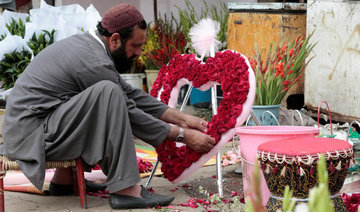CAIRO: Flowers, teddy bears and a proliferation of red hearts have plastered shop fronts in Cairo as Egyptians this week rekindled their annual love affair with Valentine’s Day.
Feb. 14 is one of the most celebrated events in Egypt despite the country’s at times conservative culture and the fact it is largely a Western tradition. Across the country, restaurants, hotels, florists and taxi drivers rush to cash in. But there have also been the annual grumblings from conservatives condemning the date’s popularity.
On Monday, Dar El-Ifta, the Egyptian government body founded to represent Islam and a center for Islamic legal research, said for the first time that Valentine’s Day is not forbidden in Islam.
This has led to a split in opinion on Egyptian talk shows, with channels such as Al-Haya and CBC airing debates questioning whether or not it is appropriate for a religious body to interfere in such matters.
“There are many foreign holidays that are ignored in Egypt, but Valentine’s Day is one that caught on because it hits a very important emotion with Egyptians — love,” Rola Kharsa, a TV presenter and author, told Arab News. “Love was never considered taboo in Egypt, I think it was just the fact that it was Western. But over the years, thanks to TV and especially thanks to social media, Valentine’s Day has become accepted within all social classes.”
As far back as the 1950s, Egypt had its own version of Valentine’s Day on Nov. 4. This was set by Mustafa and Ali Amin, founders of the publishing house “Akhbar Al-Yom” after publishing a poll in their paper asking people when they thought it should be celebrated.
But the date never caught on in the same way as the Western date of Feb. 14, even though it was known as “Hearts Day” up until the last decade.
In Cairo, the frenzy for the modern Valentine’s Day starts at least a week ahead of Feb. 14.
Florists raise their prices to extortionate levels, with the cost of a bouquet starting at $17 up to $55. And unlike the rest of the year, there is no room to haggle because demand is so high.
“February is the most profitable month of the year for me thanks to Valentine’s Day,” Sherif, a florist in the upscale Zamalek neighborhood, told Arab News. “But I don’t just like it because of the business. I think that it is nice that there is a day that celebrates love, and it makes me happy to see so many people in my shop buying my flowers to give to the ones they love.”
Hotel restaurant reservations also fill up quickly and offer special Valentine’s menus that — while delicious — cost much more than during the rest of the year.
“I think Valentine’s Day is such a big deal because of the fact that we’re a society that is caught between trying to be too open-minded and being like ‘Americans or Europeans,’ and the other extreme which considers it taboo,” Aya, a student at the American University in Cairo, said. “Most people in Egypt used to only celebrate birthdays, so what happens is that because people are so desperate to have someone to spend Valentine’s Day with, they also try to make it not so taboo by making it a big national event.”
While Valentine’s Day is being celebrated by more and more people of all social classes around the country, some hard-line conservatives are still against it, along with all other non-Muslim holidays.
Abu Islam, a controversial Salafist preacher sparked outrage in 2013 when he referred Valentine’s Day as “adultery day” that was only celebrated by Christians.
This mentality — while not as widely expressed as it was in 2013 before the conservative President Mohamed Morsi was in power — is still heard in some parts of Egyptian society.
But with Egyptians continuing to embrace Western celebrations and holidays and making them their own, it appears to be declining.
“My daughter just received flowers from an admirer,” said Sharbat, a domestic cleaner from the poor Imbaba neighborhood in Cairo. “Other than the fact that they are overpriced, I have no problem with it. In fact, every year I see the shops advertising Valentine’s Day more than the last.”
Egypt’s love affair with Valentine’s Day
Egypt’s love affair with Valentine’s Day

Ending war in Gaza is ‘Trump’s utmost priority’

- Israel’s refusal to allow free and safe entry of aid is key sticking point in Doha truce talks
WASHINGTON: US President Donald Trump’s “utmost priority” is to end the war in Gaza and free hostages held by Hamas, the White House said on Monday before a crucial meeting with Israeli Prime Minister Benjamin Netanyahu.
Trump’s special envoy Steve Witkoff will this week travel to Qatar, where Israel and Hamas are holding indirect talks. Israel’s refusal to allow the free and safe entry of humanitarian aid into Gaza remains the main obstacle to progress in the ceasefire talks in Doha, Palestinian sources said. Mediators hosted two more rounds of discussions on Monday.
The US-backed proposal for a 60-day ceasefire envisages a phased release of hostages, Israeli troop withdrawals from parts of Gaza and discussions on ending the war entirely.
Hamas has long demanded a final end to the war before it would free remaining hostages, but Israel will not halt fighting until all hostages are free and Hamas dismantled. Trump said last week that he would be “very firm” with Netanyahu on the need for a speedy Gaza deal.
However, Israel has intensified its military campaign in Gaza and sharply restricted food distribution. “God willing, a truce will take place,” Mohammed Al-Sawalheh, 30, from Jabaliya in northern Gaza, said on Monday after another Israeli air strike. “We cannot see a truce while people are dying. We want a truce that will stop this bloodshed.”
Syrian wildfires spread for fifth day due to heavy winds and war remnants

- The fires have proven difficult to bring under control despite reinforcements from Jordan, Turkiye and Lebanon
LATAKIA: Syrian firefighters are facing heavy winds, high temperatures and ordnance left behind from the 13-year civil war as they try to extinguish some of country’s worst wildfires in years for the fifth day, a government minister said Monday.
The fires, which started last week, have proven difficult to bring under control despite reinforcements from Jordan, Turkiye and Lebanon that came to the war-torn country to help Syrian teams fight the blaze.
Syrian Minister of Emergency and Disaster Management Raed Al-Saleh said their main challenges are two locations in the coastal province of Latakia that they have been trying to control for two days.
“We have controlled other locations,” Al-Saleh told The Associated Press at the scene.
On the second day of the fire, firefighters managed to get 90 percent of the wildfires under control but explosions of left-over war ordnance and heavy winds helped spread the fires again, Al-Saleh said. He added that 120 teams are fighting the blazes.
On Monday, the Lebanese army said it sent two helicopters to help fight the fires in coordination with Syrian authorities.
Over the weekend, UN teams deployed to the Syrian coast where they are conducting urgent assessments to determine the scale of the damage and to identify the most immediate humanitarian needs.
Summer fires are common in the eastern Mediterranean region, where experts warn that climate change is intensifying conditions that then lead to blazes.
Also, below-average rainfall over the winter left Syrians struggling with water shortages this summer, as the springs and rivers that normally supply much of the population with drinking water have gone dry.
US envoy praises Lebanon’s ‘well-balanced’ response on Hezbollah disarmament

- Ambassador Tom Barrack holds separate talks with President Aoun, PM, parliament speaker
- ‘An opportunity is on the horizon,’ he says
BEIRUT: US envoy Tom Barrack said he was “very satisfied” with how Lebanon responded to a US proposal aimed at disarming Hezbollah.
The comments from the US ambassador to Turkiye and special envoy for Syria and Lebanon came after his meeting with President Joseph Aoun on Monday.
Barrack’s meetings with Lebanese officials took place while Israeli reconnaissance planes were hovering over Beirut and the Presidential Palace in Baabda.
A security source told Arab News that the US delegation “expressed its surprise at the overflight, using the term ‘weird’ to describe it, especially since the roar of the aircraft was audible inside the meeting hall.”
Barrack received the Lebanese leadership’s response to the US proposals aimed at establishing a road map for implementing the ceasefire agreement between Hezbollah and Israel, and focusing on confining weapons solely to the Lebanese state.
On the eve of Barrack’s visit, the Israeli army launched a series of airstrikes on several areas in the south and the Bekaa Valley. The attacks left 10 people injured, including a child, the Ministry of Health said.
Besides Aoun, Barrack held talks with Lebanon’s Parliament Speaker Nabih Berri — who is in charge of communicating with Hezbollah regarding the negotiations with the American side — and Prime Minister Nawaf Salam, with each meeting lasting over an hour.
In a statement issued by its media office, the presidency emphasized that Aoun provided Lebanese ideas for a comprehensive solution.
Berri’s media office said that the meeting was “very good and constructive and clearly took into account Lebanon’s interests and sovereignty, the concerns of the Lebanese people and Hezbollah’s demands.”
A political source told Arab News that Hezbollah “did not provide the response-drafting committee with answers but rather a set of questions reflecting its concerns.”
In a press conference at the presidential palace, Barrack described his meeting with Aoun as “very interesting and satisfying.”
US President Donald Trump and Secretary of State Marco Rubio were “deeply grateful for the promptness and the well-balanced, considerate tone of the response to our proposals,” he said.
“It is a highly critical period for Lebanon and the region. An opportunity is on the horizon as the region undergoes significant changes and everything is moving at a remarkable pace. The countries around us are undergoing constant transformation,” he said.
Barrack said Trump had expressed his commitment to and deep respect for Lebanon, as well as his support and desire to help it achieve peace and prosperity.
“I don’t believe there has been any statement like that since the time of Dwight Eisenhower,” he said.
On the Lebanese response, Barrack said: “It is thoughtful and considered. We are creating a go-forward plan and to make that we need dialogue. What the government gave us was something spectacular in a very short period. I’m unbelievably satisfied with the response.
“Now what it takes is delving deeper and taking the time to reflect on the details, which we are going to do. I’m very hopeful.
“Of course the complexity of all this is massive but at the end of it, it is simple: Is everybody tired of what has gone on for the past years? And I think the answer is: absolutely yes. Now that we have a new architecture, we must seize the opportunity. Now everybody is going to have to give up something.
“But when you give up something of a hope and expectation of an illusion, of the adversariness that we have had internally, you can get support from the world to do that.”
Regarding how to deal with Hezbollah’s refusal to hand over its weapons to the state, Barrack said: “The good news for the US is that we do not intend to deal with it. We intend for you to deal with it.
“If you want change, you change it, and we will be there to support you. But if you do not want change, it is no problem. This is a call to action.”
Lebanon risked being left behind as change swept through other countries in the region, he said.
Regarding guarantees for Lebanon, Barrack said that “what happened previously was that the specificity in the cessation of hostility agreement just was not sufficient. So neither side trusted the other.
“The mistrust between Israel, Hezbollah and the Lebanese army, all the pieces just never came together, because everybody was in such a hurry to get a transaction done. What your government is doing now is filling in those details.”
The envoy referred to the Taif Agreement, which he considered “almost identical to what is happening today. So let us take lessons from the past.”
“My belief is that Israel wants peace with Lebanon, how to get there is a challenge. Hezbollah is a political party but it also has a militant aspect to it.
“It needs to see that there is a future for it and that that road is not harnessed just solely against it and that there is an intersection of peace and prosperity for it also.”
Barrack said Israel “does not seek war with Lebanon. It is not an occupying force nor does it harbor ambitions to control the country.
“On the contrary, it respects the shared Levantine culture that unites the region. The conflict has been a nightmare for both sides and a growing fatigue is evident.
“Today, a genuine opportunity exists, made possible by the leadership of the US president, particularly through his decisive stance on Israel and Iran. Israel finds itself at a moment of introspection, seeking to show the world that it values patience and is committed to regional calm. I believe their intentions are sincere.
“Syria, once overwhelmed by chaos, is now entering a new phase, marked by hope that the international community will support its reconstruction efforts, which are beginning from the ground up,” Barrack said.
Addressing the prospect of a Syria-Israel agreement, he said: “Dialogue between the two sides has already begun, and we are no longer constrained by the events of 1967, 1974, 1982, 1993, or even by UN Resolution 1707.
“While these events hold historical significance, they are no longer the focal point. What matters now is that all parties are actively seeking to reach an understanding, an effort to de-escalate tensions and bring an end to hostilities through a meaningful agreement.”
According to sources, the Lebanese response “reaffirmed its commitment to Resolution 1701, including the extension of state authority south of the Litani River and the dismantling of unauthorized installations.”
However, it linked “the exclusivity of arms control to Israel’s full implementation of its obligations under the same resolution,” they said.
The Lebanese response stopped short of detailing how Hezbollah would withdraw its weapons north of the Litani and offered neither an implementation mechanism nor a defined timeline for action.
The Lebanese response urged “Arab sponsorship of Lebanese-Syrian relations, emphasizing the importance of facilitating the return of Syrian refugees and strengthening control over the shared border.
“It also underscored the need to address the issue of Palestinian faction arms, under the Taif Agreement and the provisions of Resolution 1701,” the sources said.
Petra tourist numbers plunge by 75 percent due to Iran-Israel war

- Jordan’s major attraction has 16,207 foreign visitors in June compared with 68,349 during the same month in 2023, according to tourism authority
- Hotels in Petra say more than 90 percent of bookings canceled, leading to closures and staff layoffs
LONDON: The number of foreign visitors to the ancient city of Petra in southern Jordan fell by more than 75 percent in June compared with previous years due to the outbreak of fighting between Iran and Israel, and the conflict in Gaza.
The Petra Development and Tourism Region Authority recorded 16,207 foreign visitors in June compared with 68,349 during the same month in 2023 and 53,888 in June 2019.
The authority said on Monday that the number of foreign visitors in the first half of 2025 has fallen sharply. It recorded 259,798 visitors, including 175,510 foreign tourists, compared with 692,595 visitors, including 606,000 foreigners, in the first half of 2023.
Fares Braizat, head of the Board of Commissioners of the Petra Development and Tourism Region Authority, said that the Israeli conflict in the Gaza Strip, which began in October 2023, along with hostilities between Iran and Israel in June, has significantly contributed to the sharp decline in foreign tourism to Petra.
Middle East airspace was empty of any flight traffic at times during the 12 days of war in June, as Israel launched airstrikes inside Iran, and Tehran fired missiles and combat drones toward Israeli towns. The US also targeted three nuclear sites in Iran. Although there was no travel alert for Jordan by Western countries, similar warnings were issued for Israel, Iran, and later for Qatar as tensions escalated.
Braizat said that the decline in domestic and Arab tourist numbers to Petra has added to the challenges facing tourism businesses since 2023, leading to a decline in revenue. About 85 percent of Jordan’s population depends on tourism, directly or indirectly, with entry fees to archaeological sites the authority’s primary source of income.
He said that the authority has set up plans to support the tourism sector, with hotels in Petra saying that more than 90 percent of bookings have been canceled, leading to closures and staff layoffs.
Abdullah Hasanat, president of the Petra Hotel Cooperative Association, said that 28 hotels with a total of 1,975 rooms have been forced to close, representing 56 percent of all hotel rooms in the Petra region.
Blaze at Cairo telecommunications building disrupts communications, injures 22

- People were unable to make phone calls, and a major Internet disruption was registered after the fire erupted in the building in central Cairo
CAIRO: At least 22 people were injured after a fire broke out on Monday in a key telecoms data center in Cairo, the spokesperson of Egypt’s health ministry told Reuters, as disruptions of communications across the capital were recorded.
A state TV reporter said it had been contained.
People were unable to make phone calls, and a major Internet disruption was registered after the fire erupted in the building in central Cairo, with Internet monitoring group Netblocks saying network data showed national connectivity at 62 percent of ordinary levels.
The health ministry also posted alternative numbers for ambulance services across different governorates in case people were unable to reach its main hotline.
Besides phone calls, some digital banking services were also impacted including credit cards, ATM machines and online transactions, a bank source and residents said. Banks had already been closed for the day.
The injuries were mostly because of smoke inhalation, health ministry spokesperson Hossam Abdel Ghaffar said.
“A fire broke out this evening in one of the equipment rooms at the Ramses switchboard of the Telecom Egypt company , which led to a temporary disruption of telecommunications services,” the National Telecom Regulatory Authority said in a statement.
It said services would be restored over the next few hours, after power to the whole building was cut off as a safety measure.
A plume of smoke could be seen above the Ramses district.
The state news agency MENA said the fire had been prevented from spreading to the entire building and neighboring rooftops.
An initial examination indicated that the fire was likely to have been caused by an electrical short circuit, MENA cited a security source as saying.




















